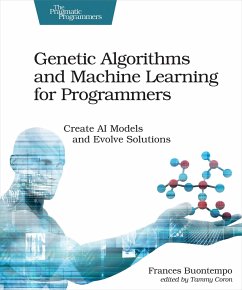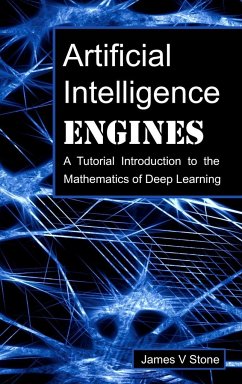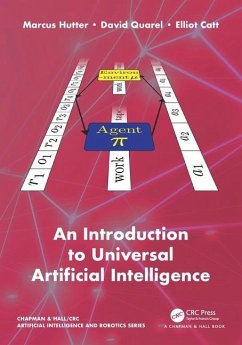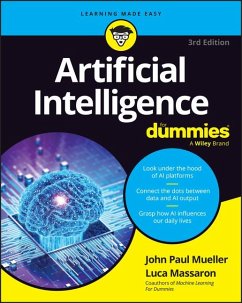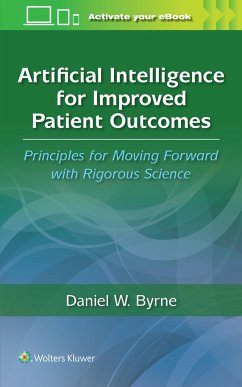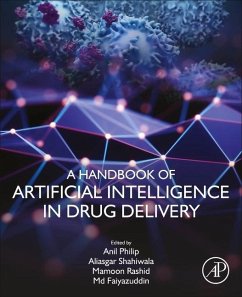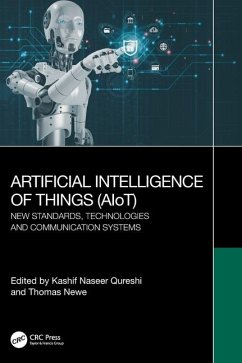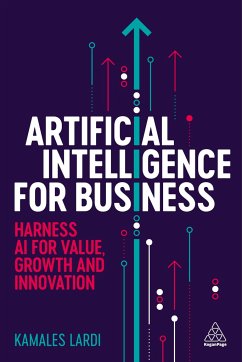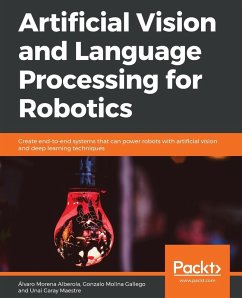
Artificial Intelligence
A Guide to Intelligent Systems

PAYBACK Punkte
58 °P sammeln!
Artificial Intelligence is often perceived as being a highly complicated, even frightening subject in Computer Science. This view is compounded by books in this area being crowded with complex matrix algebra and differential equations - until now. This book, evolving from lectures given to students with little knowledge of calculus, assumes no prior programming experience and demonstrates that most of the underlying ideas in intelligent systems are, in reality, simple and straightforward. The main attraction of the author's approach is in his deliberate de-emphasising of the maths just enough to give a valid treatment of the subject. This is what makes the underlying ideas in AI so much easier to understand. No wonder that this book has already been adopted by more that 250 universities around the world and translated into many languages.
Are you looking for a genuinely lucid, introductory text for a course in AI or Intelligent Systems Design? Perhaps youre a non-computer science professional looking for a self-study guide to the state-of-the art in knowledge based systems? Either way, you cant afford to ignore this book.
Covers:
· Rule-based expert systems
· Fuzzy expert systems
· Frame-based expert systems
· Artificial neural networks
· Evolutionary computation
· Hybrid intelligent systems
· Knowledge engineering
· Data mining
New to this edition:
· New chapter on data mining and knowledge discovery
· New section on clustering with a self-organising neural network
· Four new case studies
· Completely updated to incorporate the latest developments in this fast-paced field.
Dr Michael Negnevitsky is a Professor in Electrical Engineering and Computer Science at the University of Tasmania, Australia. The book has developed from lectures to undergraduates. Educated as an electrical engineer, Dr Negnevitskys many interests include artificial intelligence and soft computing. His research involves the development and application of intelligent systems in electrical engineering, process control and environmental engineering. He has authored and co-authored over 300 research publications including numerous journal articles, four patents for inventions and two books.
Product Description
Negnevitsky shows students how to build intelligent systems drawing on techniques from knowledge-based systems, neural networks, fuzzy systems, evolutionary computation and now also intelligent agents. The principles behind these techniques are explained without resorting to complex mathematics, showing how the various techniques are implemented, when they are useful and when they are not. No particular programming language is assumed and the book does not tie itself to any of the software tools available. However, available tools and their uses are described, and program examples are given in Java.
The lack of assumed prior knowledge makes this book ideal for any introductory courses in artificial intelligence or intelligent systems design, while the contemporary coverage means more advanced students will benefit by discovering the latest state-of-the-art techniques, particularly in intelligent agents and knowledge discovery.
Features + Benefits
No mathematical or programming prerequisites.
Linked coverage of all the latest artificial intelligence topics.
Question and answer format.
Accompanying website including student projects, accompanying software tools, software demonstrations, PowerPoint slides and solutions to exercises.
Backcover
Artificial Intelligence is often perceived as being a highly complicated, even frightening, subject in Computer Science. This view is compounded by books in this area being crowded with complex matrix algebra and differential equations until now. This book, evolving from lectures given to students with little knowledge of calculus, assumes no prior programming experience and demonstrates that most of the underlying ideas in intelligent systems are, in reality, simple and straightforward. The main attraction of the author's approach is in his deliberate de-emphasising of the maths just enough to give a valid treatment of the subject. This is what makes the underlying ideas in AI so much easier to understand. No wonder that this book has already been adopted by more than 250 universities around the world and translated into many languages.
Are you looking for a genuinely lucid, introductory text for a course in AI or Intelligent Systems Design? Perhaps youre a non-computer science professional looking for a self-study guide to the state-of-the art in knowledge-based systems? Either way, you cant afford to ignore this book.
Covers:
Rule-based expert systems
Fuzzy expert systems
Frame-based expert systems
Artificial neural networks
Evolutionary computation
Hybrid intelligent systems
Knowledge engineering
Data mining
New to this edition:
New chapter on data mining and knowledge discovery
New section on clustering with a self-organising neural network
Four new case studies
Completely updated to incorporate the latest developments in this fast-paced field.
Dr Michael Negnevitsky is a Professor in Electrical Engineering and Computer Science at the University of Tasmania, Australia. The book has developed from his lectures to undergraduates. Educated as an electrical engineer, Dr Negnevitskys many interests include artificial intelligence and soft computing. His research involves the development and application of intelligent systems in electrical engineering, process control and environmental engineering. He has authored and co-authored over 300 research publications including numerous journal articles, four patents for inventions and two books.
Contents
Preface xii
New to this edition xiii
Overview of the book xiv
Acknowledgements xvii
1 Introduction to knowledge-based intelligent systems 1
1.1 Intelligent machines, or what machines can do 1
1.2 The history of artificial intelligence, or from the Dark Ages
to knowledge-based systems 4
1.3 Summary 17
Questions for review 21
References 22
2 Rule-based expert systems 25
2.1 Introduction, or what is knowledge? 25
2.2 Rules as a knowledge representation technique 26
2.3 The main players in the expert system development team 28
2.4 Structure of a rule-based expert system 30
2.5 Fundamental characteristics of an expert system 33
2.6 Forward chaining and backward chaining inference
techniques 35
2.7 MEDIA ADVISOR: a demonstration rule-based expert system 41
2.8 Conflict resolution 47
2.9 Advantages and disadvantages of rule-based expert systems 50
2.10 Summary 51
Question
Are you looking for a genuinely lucid, introductory text for a course in AI or Intelligent Systems Design? Perhaps youre a non-computer science professional looking for a self-study guide to the state-of-the art in knowledge based systems? Either way, you cant afford to ignore this book.
Covers:
· Rule-based expert systems
· Fuzzy expert systems
· Frame-based expert systems
· Artificial neural networks
· Evolutionary computation
· Hybrid intelligent systems
· Knowledge engineering
· Data mining
New to this edition:
· New chapter on data mining and knowledge discovery
· New section on clustering with a self-organising neural network
· Four new case studies
· Completely updated to incorporate the latest developments in this fast-paced field.
Dr Michael Negnevitsky is a Professor in Electrical Engineering and Computer Science at the University of Tasmania, Australia. The book has developed from lectures to undergraduates. Educated as an electrical engineer, Dr Negnevitskys many interests include artificial intelligence and soft computing. His research involves the development and application of intelligent systems in electrical engineering, process control and environmental engineering. He has authored and co-authored over 300 research publications including numerous journal articles, four patents for inventions and two books.
Product Description
Negnevitsky shows students how to build intelligent systems drawing on techniques from knowledge-based systems, neural networks, fuzzy systems, evolutionary computation and now also intelligent agents. The principles behind these techniques are explained without resorting to complex mathematics, showing how the various techniques are implemented, when they are useful and when they are not. No particular programming language is assumed and the book does not tie itself to any of the software tools available. However, available tools and their uses are described, and program examples are given in Java.
The lack of assumed prior knowledge makes this book ideal for any introductory courses in artificial intelligence or intelligent systems design, while the contemporary coverage means more advanced students will benefit by discovering the latest state-of-the-art techniques, particularly in intelligent agents and knowledge discovery.
Features + Benefits
No mathematical or programming prerequisites.
Linked coverage of all the latest artificial intelligence topics.
Question and answer format.
Accompanying website including student projects, accompanying software tools, software demonstrations, PowerPoint slides and solutions to exercises.
Backcover
Artificial Intelligence is often perceived as being a highly complicated, even frightening, subject in Computer Science. This view is compounded by books in this area being crowded with complex matrix algebra and differential equations until now. This book, evolving from lectures given to students with little knowledge of calculus, assumes no prior programming experience and demonstrates that most of the underlying ideas in intelligent systems are, in reality, simple and straightforward. The main attraction of the author's approach is in his deliberate de-emphasising of the maths just enough to give a valid treatment of the subject. This is what makes the underlying ideas in AI so much easier to understand. No wonder that this book has already been adopted by more than 250 universities around the world and translated into many languages.
Are you looking for a genuinely lucid, introductory text for a course in AI or Intelligent Systems Design? Perhaps youre a non-computer science professional looking for a self-study guide to the state-of-the art in knowledge-based systems? Either way, you cant afford to ignore this book.
Covers:
Rule-based expert systems
Fuzzy expert systems
Frame-based expert systems
Artificial neural networks
Evolutionary computation
Hybrid intelligent systems
Knowledge engineering
Data mining
New to this edition:
New chapter on data mining and knowledge discovery
New section on clustering with a self-organising neural network
Four new case studies
Completely updated to incorporate the latest developments in this fast-paced field.
Dr Michael Negnevitsky is a Professor in Electrical Engineering and Computer Science at the University of Tasmania, Australia. The book has developed from his lectures to undergraduates. Educated as an electrical engineer, Dr Negnevitskys many interests include artificial intelligence and soft computing. His research involves the development and application of intelligent systems in electrical engineering, process control and environmental engineering. He has authored and co-authored over 300 research publications including numerous journal articles, four patents for inventions and two books.
Contents
Preface xii
New to this edition xiii
Overview of the book xiv
Acknowledgements xvii
1 Introduction to knowledge-based intelligent systems 1
1.1 Intelligent machines, or what machines can do 1
1.2 The history of artificial intelligence, or from the Dark Ages
to knowledge-based systems 4
1.3 Summary 17
Questions for review 21
References 22
2 Rule-based expert systems 25
2.1 Introduction, or what is knowledge? 25
2.2 Rules as a knowledge representation technique 26
2.3 The main players in the expert system development team 28
2.4 Structure of a rule-based expert system 30
2.5 Fundamental characteristics of an expert system 33
2.6 Forward chaining and backward chaining inference
techniques 35
2.7 MEDIA ADVISOR: a demonstration rule-based expert system 41
2.8 Conflict resolution 47
2.9 Advantages and disadvantages of rule-based expert systems 50
2.10 Summary 51
Question
Artificial Intelligence is one of the most rapidly evolving subjects within the computing/engineering curriculum, with an emphasis on creating practical applications from hybrid techniques. Despite this, the traditional textbooks continue to expect mathematical and programming expertise beyond the scope of current undergraduates and focus on areas not relevant to many of today's courses. Negnevitsky shows students how to build intelligent systems drawing on techniques from knowledge-based systems, neural networks, fuzzy systems, evolutionary computation and now also data mining. The principles behind these techniques are explained without resorting to complex mathematics, showing how the various techniques are implemented, when they are useful and when they are not. No particular programming language is assumed and the book does not tie itself to any of the software tools available. However, available tools and their uses will be described and program examples will be given in MATLAB. The lack of assumed prior knowledge makes this book ideal for any introductory courses in artificial intelligence or intelligent systems design, while the contemporary coverage means more advanced students will benefit by discovering the latest state-of-the-art techniques. The book covers: * Rule-based expert systems * Fuzzy expert systems * Frame-based expert systems * Artificial neural networks * Evolutionary computation * Hybrid intelligent systems * Knowledge engineering * Data mining
Dieser Artikel kann nur an eine deutsche Lieferadresse ausgeliefert werden.




